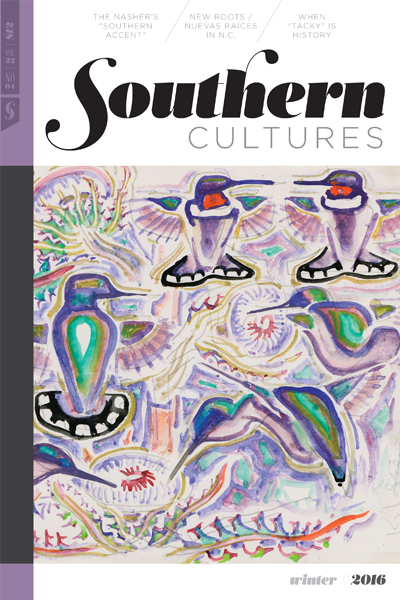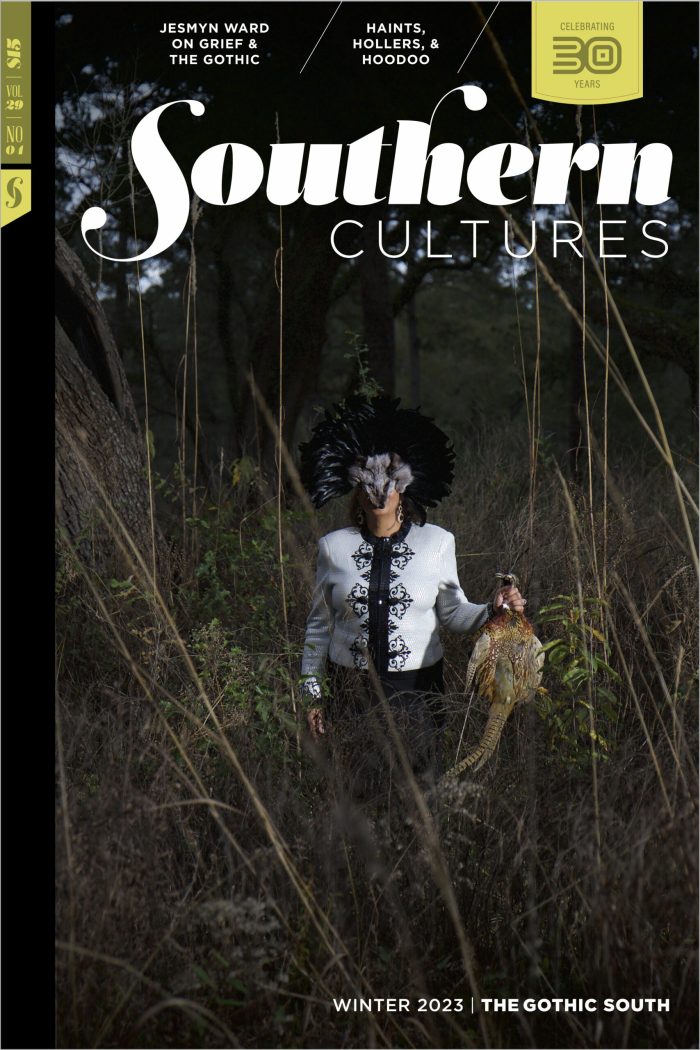by Harry Watson
“It’s true that many of the “peculiar institutions” that once made the South indisputably distinctive are gone or fading, though whether this will efface southern identity or merely change it remains unsettled.” Beginning in the mid 1970s, millions of Americans began to reclaim their “roots,” partly inspired by Alex Haley’s gripping book and movie about »
The Long History of Benevolence, Self-Help, and Parades in New Orleans
by Leslie Gale Parr
Even in a nation inclined to “constantly form associations,” as de Tocqueville observed in 1831, residents of New Orleans excelled in organizing lodges, religious groups, literary societies, charitable organizations, sporting clubs, social clubs, and, most of all, benevolent associations, the most popular—and practical—organizations to which New Orleans’ polyglot population flocked. By 1880, these organizations (also »
Interview
Stories from Carolina del Norte
by Jaycie Vos,
Maria Silvia Ramirez,
Laura Villa-Torres,
Hannah Gill
Although there is a longer history of Latino1 migration to the United States, in recent decades, individuals from across Central and South America and the Caribbean have been putting down new roots in the U.S. South at a particularly high rate, bringing about significant social, cultural, political, and economic change. Home to one of the fastest »
Interview
A Comparison of Two Notorious Southern Lawmen
by James Reston Jr.
“‘That night, they blew up King’s motel, and every police car they had in Birmingham got torn up. I left. I didn’t have anything in common with Bull Connor.’” Early in the Hollywood movie Selma, a pivotal scene depicts a 1965 conversation between Martin Luther King Jr. and a young John Lewis. The leaders of »
by Trevor Schoonmaker,
Stacy Lynn Waddell,
Jeff Whetstone
“Southern Accent: Seeking the American South in Contemporary Art” was co-curated by Trevor Schoonmaker (Nasher Museum of Art) and Miranda Lash (Speed Art Museum). Before the show opened in September 2017, we sat down with Schoonmaker and artists Stacy Lynn Waddell and Jeff Whetstone, both featured in the exhibition. “We have no idea what it »
Photo Essay
A Postscript from The South in Color
by William R. Ferris
“I passed the sign frequently and always noticed its beautiful lettering. Finally, I stopped and photographed it, thankfully, because the sign is now gone.” Editor’s Note: Outtakes from The South in Color, published by UNC Press, September 2016. This stockman’s cane was made by Victor “Hickory Stick” Bobb out of hickory wood (1976). Mr. Bobb »
Lessons Learned from Studying the South at the University of Mississippi
by Charles Reagan Wilson
On the occasion of my retirement from the University of Mississippi in 2014, I knew I had to talk about the South, the topic I have spent my career studying, pondering, writing about, and teaching. The more I thought about what to present in a final, university-wide lecture, my personal journey seemed relevant, for I »
Essay
Class, Wealth, and Power in the Real and Remembered South
by James C. Cobb
I am not sure how many of the now literally hundreds of times I had been asked by fellow southerners if I were related to the presumably aristocratic and historically prominent Cobb family of Athens (Clarke County), Georgia, before I realized that, for many of them, the question functioned as a first-stage screening device to »
Music
Southern Gospel Singing Schools
by Brooks Blevins
“The singing school may not have been a southern creation, but its proliferation in the post–Civil War years was largely a phenomenon of the South. Its survival, and revival, in the twenty-first century is almost exclusively a southern story.” He looks like he should be in pads and a helmet, protecting a quarterback on some »
Memoir
by Jennifer Ho
“I am in Jamaica because Frank wanted his ashes scattered here; he wanted to come home.” I have been in Jamaica for four days and cannot find a place that makes ox-tail stew. I ask one of my aunts, but she says that it’s not something you typically find on a restaurant menu. She’s not »
Poetry
by Ross White
Now they say the Internet is being attacked by sharks.They say. Them. You know who They are,malicious backlit figures in high- backed chairs,wearing jewel- crusted gold rings, stroking white cats.
Interview
by Southern Cultures
Meet the Southern Oral History Program, our colleagues at the Center for the Study of the American South, UNC-Chapel Hill. From its founding in 1973, the Southern Oral History Program has explored the history and culture of the American South by talking to its activists, politicians, educators, laborers, innovators, business leaders, and more. After more »
Poetry
by Southern Cultures
Interview
by Southern Cultures





